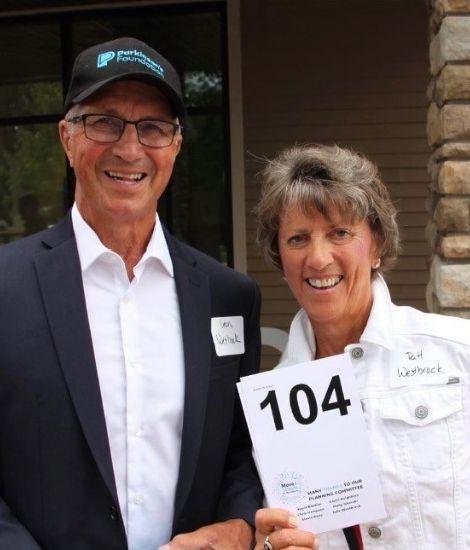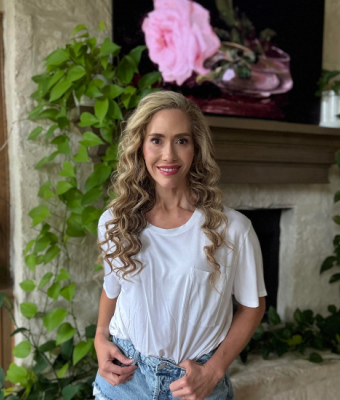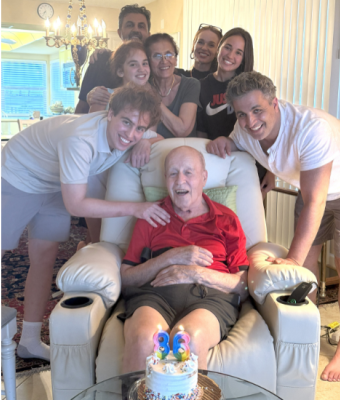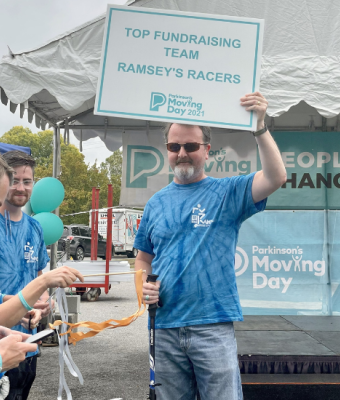My PD Story

Patt Westbrock
I was diagnosed with Parkinson’s disease (PD) 30 years ago. For me, it started as an achiness. My hands were in a lot of pain and stiff, but they weren’t trembling yet. I started looking for answers and one day, a doctor walked in the room, looked at me and said, “you have Parkinson’s” which I thought was a pretty bold statement for never having seen him before, but he was right.
After that appointment, I cried the whole way home. I was overwhelmed with questions. What does this mean for me? What does it mean for my spouse and my family?
I did not find any peace in those questions, and I did not know what to tell anybody. So, I kept it to myself. I had Parkinson’s for 15 years before I told anybody, including my kids. I was a clinical nurse, and I worried about how sharing the news would affect my job, social life and family life.
I did a lot of overthinking and watched my behavior. I held on to the things I could control until PD made it impossible. Any uncontrolled movement sent me spinning, wondering if anyone noticed. Part of my job as a nurse and diabetes educator required me to travel to different clinics to teach people how to manage their diabetes. When I was teaching the classes, my mouth would get dry, and I could hear changes in my voice. It was getting harder to hide. I just wanted to look and feel like everyone else around me, but once I hit the 15-year mark, I couldn’t hide it anymore.
When teaching those classes, I told participants they needed to focus on what they could control and the positive things they could do to manage their disease and I realized I needed to do the same thing for myself. I decided I wasn’t going to focus on the negatives of having Parkinson’s and I was going to do everything I could to slow its progression and improve my health.
Staying active is vital, and I made sure I exercised for at least 45 minutes to an hour every day.
I started to tell people in my life about my diagnosis, including my kids. That was hard and I didn’t want anyone to look at me and only see the disease. My kids were shocked, worried about me and wondered if it was hereditary. I think it took them some time to digest the news, but if anything, it has driven them to offer more help to me and my husband. They have been so supportive. My friends were also shocked. Some of them were angry I kept it from them, but I did what was best for me at the time.
Now, openly living with Parkinson’s is just part of life. As one of my friends says every time he watches me take a handful of pills, “better living through chemistry.” And in my world, that works.
I also want to share some of the things people don’t usually think about when they hear “Parkinson’s disease.” There are so many little and big ways this disease affects you.
- It makes your eyes dry. I use daily eye drops and my doctor recommended I wrap plastic wrap around my head to keep my eyes moist. All I need is a CPAP machine to look like Darth Vader when I go to bed.
- It affects your voice. My voice crackles now and I start to sound like Mae West.
- It makes opening bags difficult. Those plastic bags at the grocery store are impossible to open. So is a bag of potato chips.
- It changes the way you eat. I must have salads chopped extra fine or I end up wearing them. And do you know how hard it is to eat peas with a fork?
- It makes putting on makeup a small feat. If I’m not careful, I’ll end up looking like Lucille Ball, painted all over, or a two-year-old with a coloring book. And put on mascara at your own risk!
- It means small tasks are more difficult. Mending clothes, putting on jewelry, decorating a cake and buttoning buttons or pulling up zippers can feel impossible.
- It affects how I interact with technology. I have an iPad, but I haven’t been able to master a lot of things on it because tremors cause me to touch the same button two or three times. Same with the cash machine, where punching in my PIN number wrong has caused me to lose my card.
These things are just a matter of fact for people with Parkinson’s. These little annoyances add up and change your life. I have found ways to deal with them, and there are worse things than living with Parkinson’s, but some days, it moves to the top of the list. Which is why I got involved with the Parkinson’s Foundation. I have met many people through them, and they have made a lot of information available and have excellent resources, like Centers of Excellence, for people to receive better care. The work the Parkinson’s Foundation is doing is offering hope to those affected by PD — and everyone needs hope.
But we need to do more. We need more research so we can find new treatments and a cure for Parkinson’s. We need to make sure everyone can access the best care and find support through the Foundation’s resources.
My friends ask me how they can help, and I say the best thing they can do is make a donation. We need to invest in research so we can find a cure. We need to provide support for people with PD and their care partners. The Parkinson’s Foundation is doing this work, but they need our help. We all need to do our part and support this work. No one should have to live like this.
Related Materials
More Stories
from the Parkinson's community


